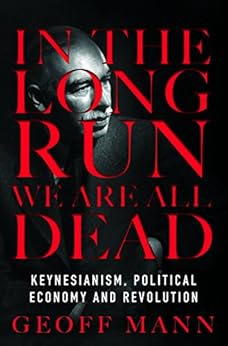 |
| Amazon link |
Maddeningly abstract and allusive, Geoff Mann's book situates Keynes within an intellectual arc stretching back to the French Revolution (1789-99) and Hegel's subsequent theorisation of its lessons for modern civilisation. A reminder of the shallowness of contemporary thinking about values, governance and the collapse of the neoliberal project.
Keynes is depicted as taking a stand against delusional neoclassical (and highly mathematicised) theories in which capitalism is assumed to be always at, or returning to equilibrium. Keynes sees the structural instabilities driving boom-bust cycles, highlighting the essential fragility of the 'civilised order'. His vision calls for conscious state action to underpin the conditions of existence of the masses, heading off a revolution of despair after which 'the deluge'.
The author shares many insights into the form elite ideology takes today, as expressed in newspapers, TV, radio and online. For example, the great issue of 'inequality' (a strangely recent concern) is actually a debate within the (bourgeois) middle-class reflecting the relative deprivation of the top 10% as compared to the super-rich 1% or 0.1% due to the neoliberal revolution and specifically the aftermath of 2008/9. The life-history of the broader working class, where unemployment, precarious employment and stagnant, low incomes remain endemic, rarely features in this debate.
Given that the entire history of anti-capitalist revolutions (over, say the last 200+ years) has been one of defeat and/or deeply unpleasant outcomes, the narrative of socialist revolution, the hopeful leap into the unknown, is completely uncompelling. An enlightened Keynesianism, seeking to save (liberal-democratic-capitalist) civilisation - by illiberal political means where necessary - may, in its final inadequacy, open the way to a more profound transformation of social relations. But we cannot assume a blueprint anywhere, and certainly not in the actually-existing Marxist canon.
Mann is too enamoured of fashionable moralistic crusading on climate change for my tastes and fails (as is usual with Marxist analysts) to factor in what we increasingly know about human nature through genomics, psychometrics and sociobiology. These omissions subtract from the force of his final conclusions, which are unnecessarily tentative. But taken as a whole the book is a tour de force of open-mindedness, synthesis and creativity.
See also: "When Keynes comes to town".
No comments:
Post a Comment
Comments are moderated. Keep it polite and no gratuitous links to your business website - we're not a billboard here.